Wasting time and other forms of grief
A spiritually flattening meditation on the art of almost doing things
There are worse ways to waste time, probably—heroin addiction, gerrymandering, maybe professional fencing—but none feel quite as spiritually flattening as watching an 18-year-old with laminated eyebrows whisper into their phone about how “everything changed for me when I started romanticising my morning routine.”
Though you probably know it well, let me set the scene: you are in bed, horizontal, crusted over in the sticky film of a life that could have been, and you’ve been scrolling for what you will later refer to (ironically, in conversation, as if this makes it okay) as “a medically inadvisable amount of time.”
You do not remember when you started. You do not remember what you were originally trying to look up. You do, however, know all six of the top TikTok soundbites currently trending, including the one that starts with a sentence so catastrophically specific that you want to both laugh and put your head in an oven and ends with “holy frickin’ airball.”
The irony, of course, is that this essay was meant to be about productivity. Or at least time. Or at least something. But I’ve now spent thirty-four minutes reorganising my inbox folders in a fit of what felt, at the time, like emotional clarity, but was in fact a kind of semantic self-harm. Do I really need a label called “Admin/WFH/Tax-ish”? Will I ever look in there? (No.) Did I feel in control while making it? (Yes.)
THE THEN AND NOW OF TIME WASTED
Wasting time used be quaint. It used to look like:
staring out the window;
doodling in the margins;
playing Snake on a Nokia 3310 while pretending to listen to the teacher explaining the Treaty of Versailles.
Now, wasting time is anything but quaint. Because now, it’s spiritual metastasis disguised as optimisation. It’s this:
being asked by a man you met at a party—not even off a dating app—if you “use your Google Calendar creatively” and by “creatively” he meant for scheduling sex;
clicking a link to an article titled 7 Habits of People Who Are Never Stressed while having heart palpitations over a WhatsApp notification that just says “12:03PM: X hearted your message”;
writing this sentence while using another sentence to distract you from the fact that time is moving and you are not.
What even is wasting time anymore? If the algorithm is tailored to your trauma, your damage, your baggage—and you know it is a bespoke little horror show made just for you, especially if you have ever had a tarot card reader tell you “He’s coming back” through your phone screen—then every delay is technically a kind of precision-targeted feedback loop. Your time isn’t wasted so much as captured. Monetised. Turned into trend data and parlayed into someone else’s downpayment on a second home in Lisbon.
And besides: wasn’t it Freud or someone similarly uninvited who said that procrastination is just misdirected libido? That our desire, when not actualised, spills sideways into compulsions that look like delay but are actually grief in disguise? (Or maybe it was a post from @on_a_downward_facing_spiral. It was captioned with “trying not to crash out rn lmaooooooo.”)
I’m not sure it matters if it was Freud or a meme account—either way, it’s true. The point is: wasting time feels like who I am now. Not something I do, but a trait. A vibe. A chronic condition. I have not made a dentist appointment in two years. I have, however, spent 46 minutes reading every review of a scented candle called Bibliothèque and then not buying it. Not because I didn’t want to. But because I was pretending, very seriously, that the restraint was virtuous and that I hadn’t been procrastinating the rest of my life because I was making an “informed decision” about an £80 candle.
There is a name for this kind of aestheticised non-action, this performative pause: it’s called “soft quitting,” or “preparing energetically,” or (if you’re really deep in it) “manifesting rest.” But I think what I’m doing is something worse: I’m rehearsing a life I’m not living, again and again, by almost doing things. Not in a Nathan Fielder way (that man’s a genius)—but in the way where I almost reply to the email. Almost read the book. Almost write the thing I said I’d write about wasting time (ha).
If you’re in the right mood, this could be almost romantic, but I don’t think I’ve ever been in the right mood when it comes to wasting time.
MARINA ABRAMOVIĆ EATS BOILED EGGS FOR BREAKFAST AND OTHER THINGS I LEARNED WHILE I WAS BUSY WASTING TIME
At some point, of course, the question becomes not why am I like this, but who benefits. Because you start to realise - usually while watching someone on Instagram Reels explain why something called the ‘Pomodoro Technique’ “literally saved their marriage”—that wasting time isn’t an individual failure anymore. It’s an economic inevitability. It’s baked in. It’s the non-action action that keeps the whole thing running.
I don’t mean that in the sexy, revolutionary sense. I mean that in the dead-eyed, scrolling-through-LinkedIn-jobs-you-will-never-apply-for sense. The platform economy requires your distraction. Instagram is a mall with no exits. Netflix is ambient noise for your anxiety. Gmail is a hydra. TikTok is a serotonin casino. You are not “wasting” time; you are offering it up, hourly, to the gods of engagement.
We’re told to romanticise slowness, to take long walks, to put our phones away, to do Morning Pages in Aesop-scented silence. But time only ever feels slow if you can afford it. The rest of us are just trying to remember if we dreamed that we paid our council tax. We are drinking coffee to work faster and eating magnesium gummies to sleep faster. We are journaling like it’s a job. We are making content about our rest and then getting exhausted by the comments.
It’s all very… what’s the word? Oh right: grim.
And yet I find myself searching, daily, for new methods to defeat the passage of time. Not even to use time well - just to trick it into not hurting. Just to make it feel manageable. To contain it. I’ll google things like “how to stop time feeling slippery” or “is everyone faking it or just me.” I’ll light a candle at 4pm and pretend that it’s self-care and not perfumed dissociation. I’ll open a new doc titled something like Wasting Time Draft 6 – this one good?? and then immediately click away to read an article about what Marina Abramović eats for breakfast.
(To save you the google: it’s boiled eggs. Are you surprised?)
A NON-EXHAUSTIVE LIST OF THE WAYS IN WHICH I HAVE WASTED TIME, HISTORICALLY
Here are just a few of the ways I waste time under the guise of being a person who is about to do something else:
I put on a podcast I’ve already listened to so I don’t have to choose a new one. It’s usually about two writers talking about writing. I do this while not writing.
I open an incognito tab to check my own Instagram. Why incognito? I don’t know. To add drama.
I walk to the corner shop to buy oat milk, forget why I’m there, and come back with bath salts I will not use, a copy of the New Yorker I will not read, and a cucumber I will never use to make homemade tzatziki.
I spend twenty-two minutes trying to pick the perfect “focus” playlist, then get irritated that I only have thirty-eight minutes left to work.
I rearrange the items on my desk so they look more “intentional,” as if that will change the content of my brain. It does not.
I save apartment listings in places I cannot afford to live. I fantasise about “starting fresh” somewhere I’ve only been once. Like Carmel-by-the-Sea. Or Glasgow. Or literally anywhere that isn’t the interior of my own skull.
The thing is: I do things. I do! I meet deadlines, I answer emails (eventually), I go to the parties I say I’ll go to. But around the edges of all that is this soft, silty wasteland of almost. I am a person suspended in a state of near-doing. An entire life composed of just-missed intentions. I clear my throat a hundred times but never speak.
And sometimes—this is the worst part—it feels good. Wasting time is an intimacy I know well. It’s private. It’s mine. It feels like being wrapped in the warm gauze of my own unrealised potential. I love it there. I hate it there. It’s cozy. It’s hell.
WE WASTE TIME BECAUSE WE ARE SAD
Let’s be honest: wasting time isn’t about boredom. It’s about grief. Low-level, ambient, mostly unspoken grief for the versions of ourselves we did not become. The books we didn’t write. The jobs we didn’t get. The people who stopped texting. The people we never texted back. The imagined futures that slipped quietly down the drain of too many Tuesdays gone by.
It’s about wondering whether you’ve already used up your best stories. Whether the thing that made you you—the bright part, the warm part, the part that had ideas and energy and jokes—is somewhere under the laundry pile of your life, quietly dying. It’s about performing busyness because the alternative—being still—is too violent. Too revealing. Too likely to bring on the terrifying realisation that maybe you are not waiting for your life to start. Maybe this is it.
And if that’s true—if this really is it—then shouldn’t you be out doing something luminous? Something bold? Something Instagrammable? Shouldn’t you be eating clams in a sun-drenched coastal town with a man who calls you “funny girl”? Shouldn’t you be feeling something more than this flickering, in-browser kind of life?
But you’re not. You’re here. You’re refreshing the email. You’re rearranging your tabs. You’re watching a girl with clear skin and trauma-informed vocabulary do her makeup while whispering “you’re safe now.” You’re not safe now. You’re stalling.
And still—some part of you believes that wasting time correctly (with enough charm, enough melancholy, enough taste) might still redeem you. Might still mean something. Might still turn into art. (You’re right. That’s what this essay is. I’m only half-kidding.)
KNOWING BETTER BUT STILL DOING IT, ANYWAY
And maybe that’s just what it is to be a person now: to both know better and still do it. To long for the kind of life where you drink a homemade cappuccino on a balcony and don’t feel the need to take a photograph of it because you’ve deleted Instagram and thus can finally finish your book, while simultaneously watching a woman from Utah wearing a linen apron slice open a boule of homemade sourdough to make sandwiches for her eleven children and ornery husband. To say you’re going to meditate and then instead spend forty minutes looking at photos of people you used to love. To light a candle. To open a new document. To scroll. To hope.
Because even if you know it’s a trap—even if you can articulate the neurology and the capitalism and the psychodrama behind your own avoidance—you’re still in it. Still here. Still haunted by the idea that one day you’ll look up from your phone and realise that everything—the love, the feeling, the realer, warmer, less screen-lit version of your life—already happened.
But also: maybe not.
Maybe you’re still becoming. Even now. Even here. Maybe every wasted hour is just a blurry, backlit prelude to the sentence you’ll actually write, the person you’ll actually call, the days that feel less like waiting rooms for the unknowable (read: scary) future and more like your life as it is right now.
Maybe nothing is wasted. Not really.
Not even the time you spent reading this, when you told yourself you’d only skim it.
Because something did happen. You were here. You read it. You felt it. You noticed.
And for a minute—just one—you stopped refreshing.





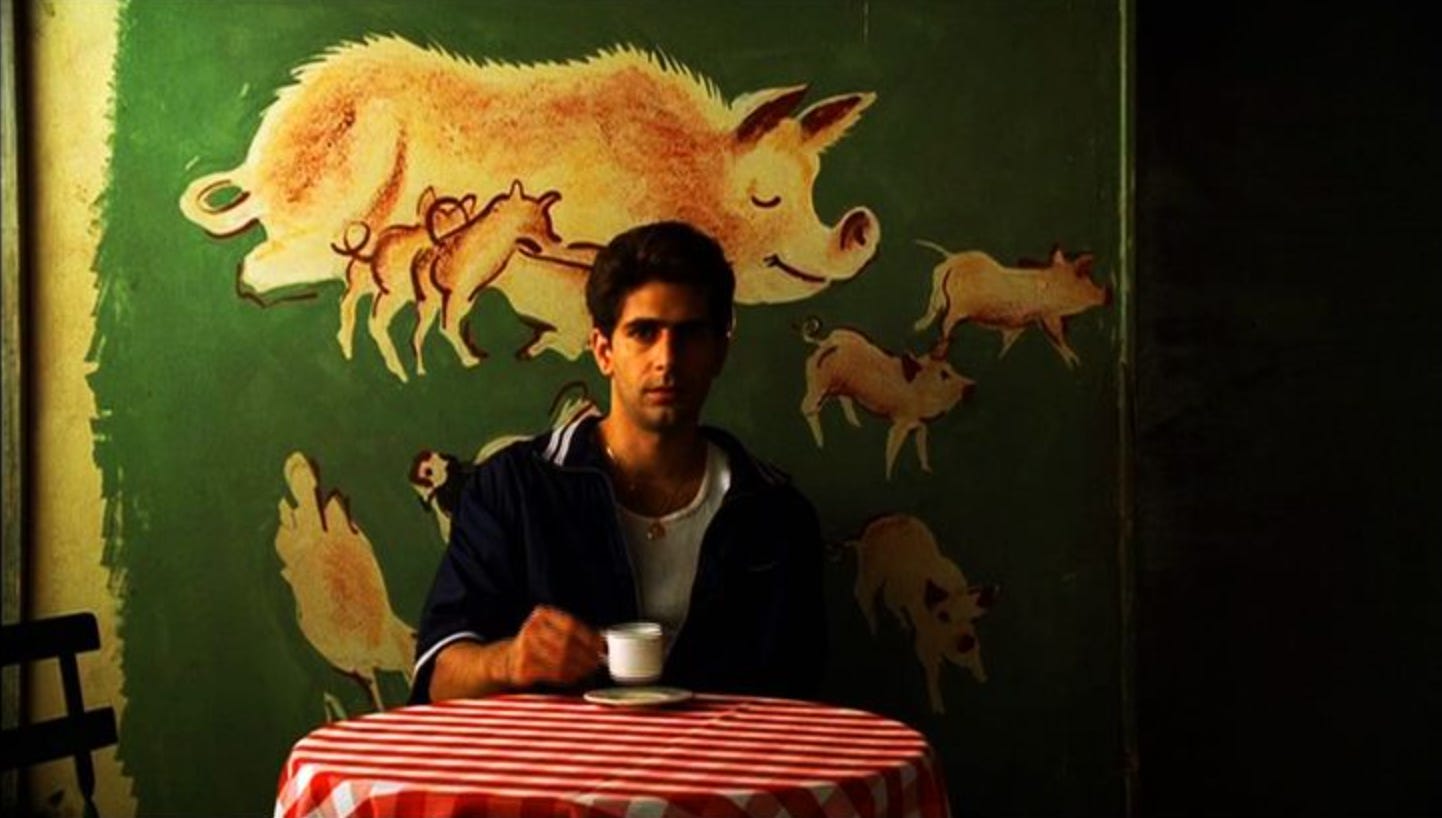
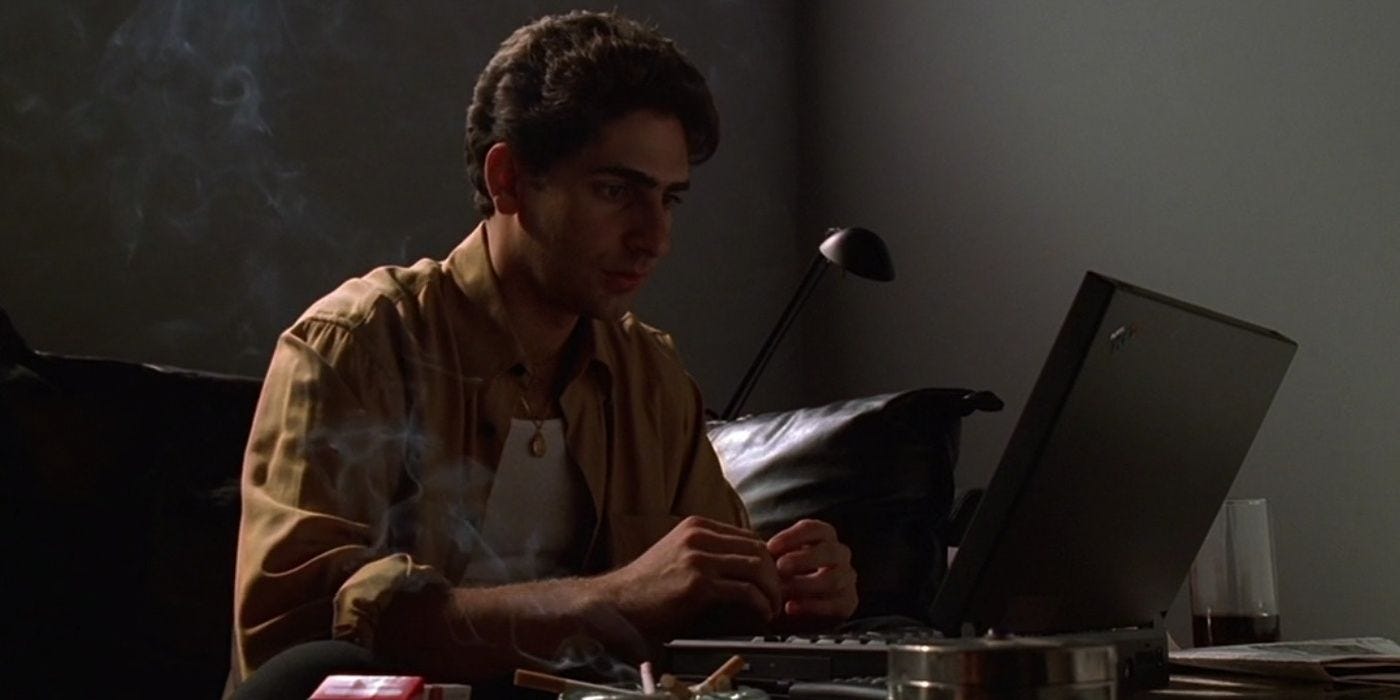
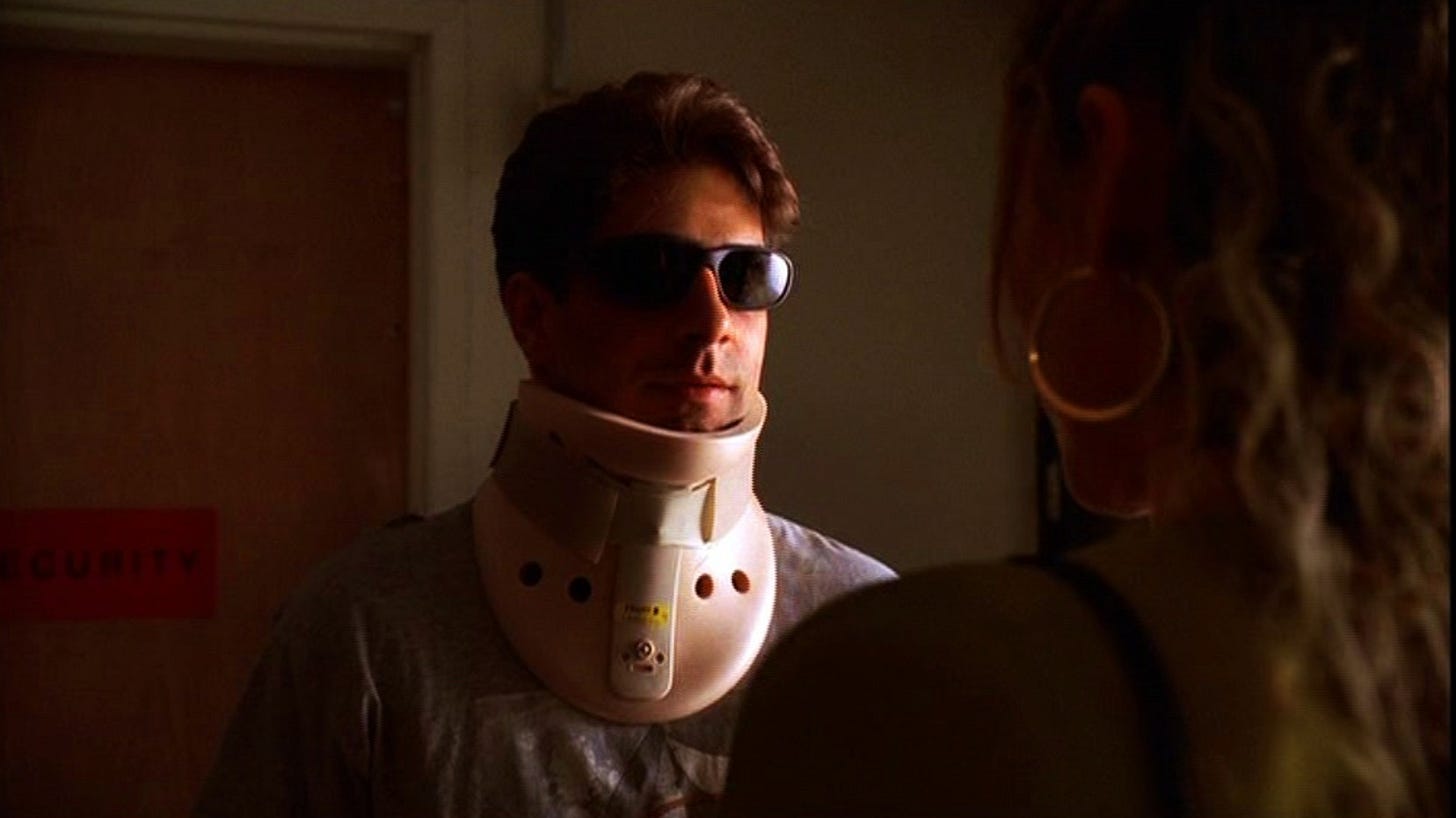
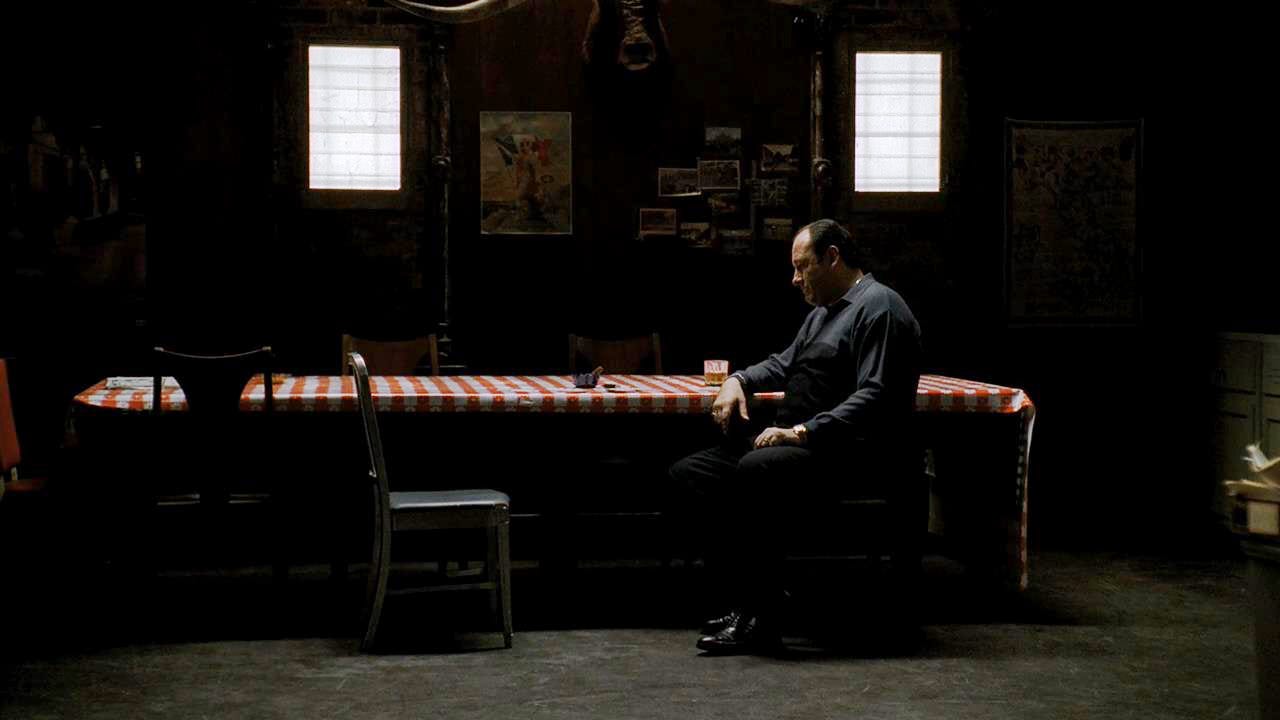
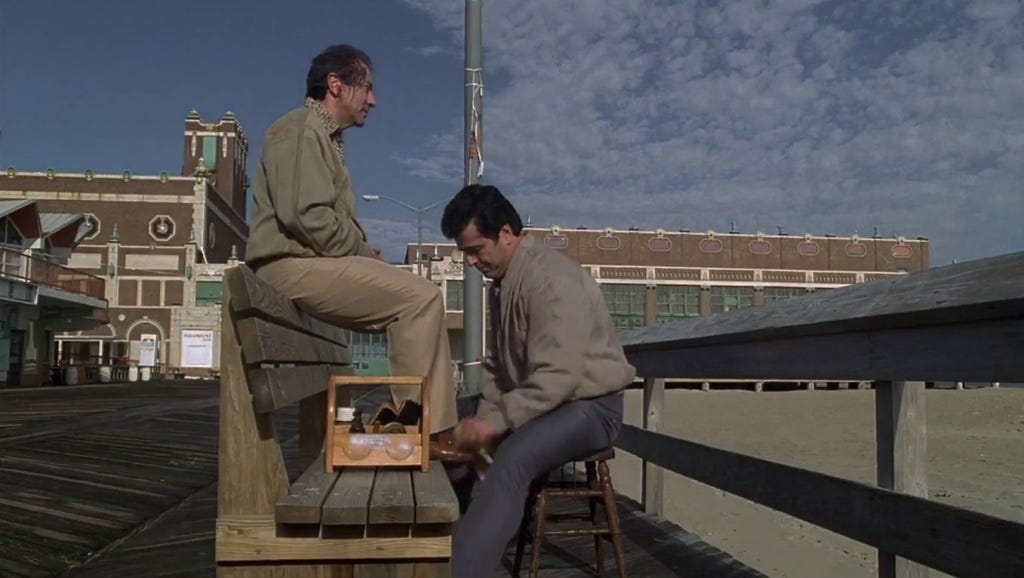
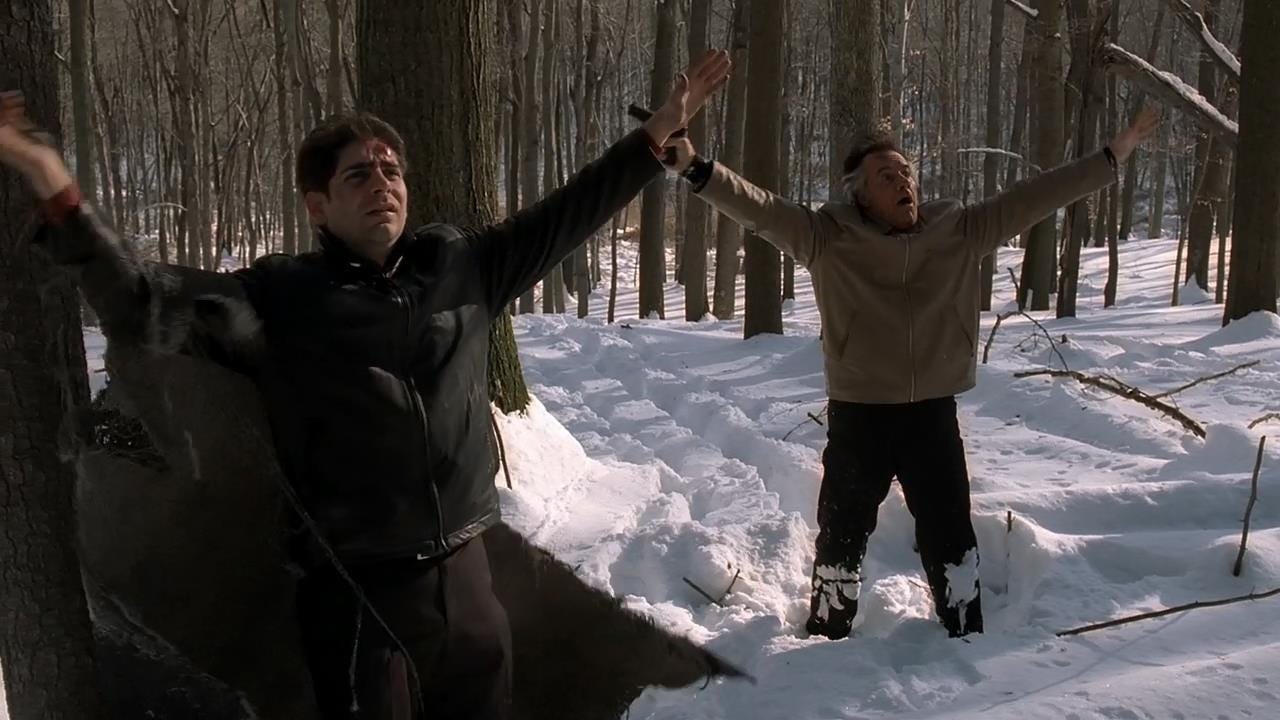
Like Paulie says in the very first episode, "Sadness accrues." Weirdly enough, I've been watching them again (third time) and intend to make it through all six seasons this summer. So rich, beguiling, moving, watching these characters in (time) waste-management.
So many well-wrought phrases here! And perceptions well-put, like "The platform economy requires your distraction. Instagram is a mall with no exits. Netflix is ambient noise for your anxiety. Gmail is a hydra. TikTok is a serotonin casino. You are not “wasting” time; you are offering it up, hourly, to the gods of engagement."
Yes, they are making money off of our addictions to scrolling. One wonders if everyone in a subway at the end of the day would be weeping and hugging each other if they didn't have phones anymore, opening to their grief and to their desire for real human connections, in person. And yet I do take a small delight in getting annoyed at the young women in tights on IG trying to coach me in how to be a better person. I should start an IG account centered around giving bad advice.
This line made me uneasy, as it hits close to home, after many years "And maybe that’s just what it is to be a person now: to both know better and still do it." Ooof.
You may feel you're rehearsing, at the ripe old age of what 28? 29? AND you've struck a nerve with the 42 people who have been touched by your essay so far, today, Friday, June 6, 2025.
I can hear your voice, which felt more like I was listening to your words instead of reading them. Almost like a long-form story on The Moth. Just great.